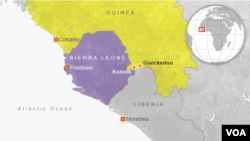Sierra Leone health officials have announced the country’s death toll from the Ebola virus outbreak in West Africa has doubled.
Sidi Yahya Tunis, director of Information and Communication for the Ministry of Health and Sanitation, said an additional six people have died since the first six deaths were reported last week.
Tunis said two of the fatalities were health workers in the country’s Kailahun district, near the border with Guinea, where the Ebola virus outbreak was first detected in January.
“As it is right now, we have 12 deaths from 42 confirmed cases of Ebola in Sierra Leone after a test of about 113 cases. That is the status as it is right now. One hundred thirteen people have been tested and, out of that, we have 42 confirmed cases of Ebola and, out of the 42 confirmed, we have 12 deaths,” he said.
Tunis said the majority of cases were found in the Kailahun District.
“We have now seen cases in the Daru Axis of Kailahun District for the past couple of days. We’ve had two cases in Kambia also, but those cases are cases that moved from Kailahun District to Kambia. So, they are taken as cases from Kailahun as well. So, all of these new numbers are still from the same Kailahun region of the country,” Tunis said.
He said two of the new deaths were health workers in the country’s Kailahun district.
“We have a community health officer in Daru, Kailahun District and also a nurse that treated the index case. She traveled from Koindu to Daru and she contracted the disease in the Koidu and traveled to Daru for medical help and fell ill in Daru, and died,” Tunis said.
Tunis said reports that some health workers abandoned their posts after learning that some of the colleagues had died from the virus were not entirely true.
“We had instances where people got agitated in that region and were making it difficult for health workers to perform their duties because we were having several riots. So, as a result, some of our health workers felt insecure to go their health posts. But, as it is right now, those health workers are in their health posts and they are performing their duties as they are supposed to be doing,” Tunis said.
Tunis described the current situation as an emergency and said the government had sought help.
“The ministry, the government and the partners are all treating this very seriously. As we speak right now, the World Health Organization has brought in experts, and we had some of those experts helping in the Sierra Leonean medical staff with this disease,” Tunis said.
Sidi Yahya Tunis, director of Information and Communication for the Ministry of Health and Sanitation, said an additional six people have died since the first six deaths were reported last week.
Tunis said two of the fatalities were health workers in the country’s Kailahun district, near the border with Guinea, where the Ebola virus outbreak was first detected in January.
“As it is right now, we have 12 deaths from 42 confirmed cases of Ebola in Sierra Leone after a test of about 113 cases. That is the status as it is right now. One hundred thirteen people have been tested and, out of that, we have 42 confirmed cases of Ebola and, out of the 42 confirmed, we have 12 deaths,” he said.
Tunis said the majority of cases were found in the Kailahun District.
“We have now seen cases in the Daru Axis of Kailahun District for the past couple of days. We’ve had two cases in Kambia also, but those cases are cases that moved from Kailahun District to Kambia. So, they are taken as cases from Kailahun as well. So, all of these new numbers are still from the same Kailahun region of the country,” Tunis said.
He said two of the new deaths were health workers in the country’s Kailahun district.
“We have a community health officer in Daru, Kailahun District and also a nurse that treated the index case. She traveled from Koindu to Daru and she contracted the disease in the Koidu and traveled to Daru for medical help and fell ill in Daru, and died,” Tunis said.
Tunis said reports that some health workers abandoned their posts after learning that some of the colleagues had died from the virus were not entirely true.
“We had instances where people got agitated in that region and were making it difficult for health workers to perform their duties because we were having several riots. So, as a result, some of our health workers felt insecure to go their health posts. But, as it is right now, those health workers are in their health posts and they are performing their duties as they are supposed to be doing,” Tunis said.
Tunis described the current situation as an emergency and said the government had sought help.
“The ministry, the government and the partners are all treating this very seriously. As we speak right now, the World Health Organization has brought in experts, and we had some of those experts helping in the Sierra Leonean medical staff with this disease,” Tunis said.






